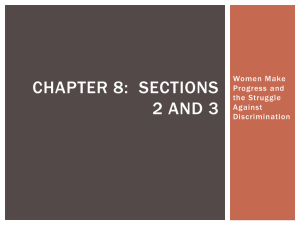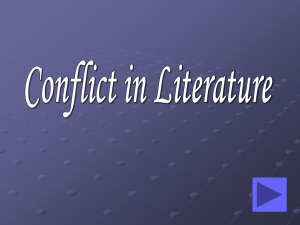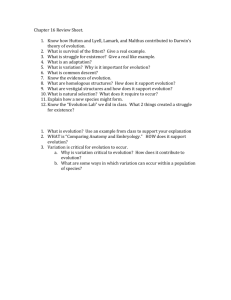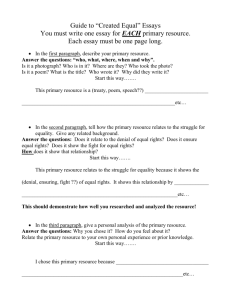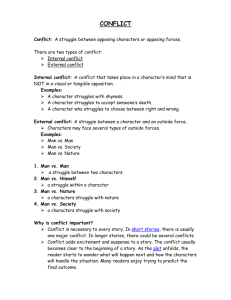PS Packet 19 - Roosevelt and African Americans at 1900
advertisement
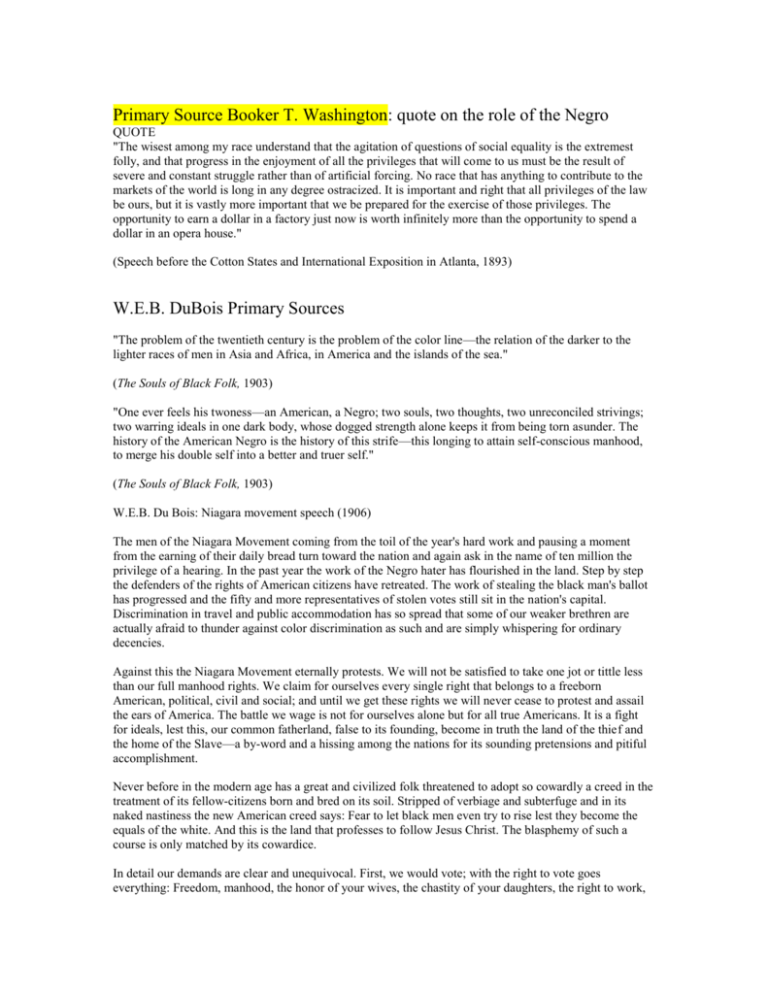
Primary Source Booker T. Washington: quote on the role of the Negro QUOTE "The wisest among my race understand that the agitation of questions of social equality is the extremest folly, and that progress in the enjoyment of all the privileges that will come to us must be the result of severe and constant struggle rather than of artificial forcing. No race that has anything to contribute to the markets of the world is long in any degree ostracized. It is important and right that all privileges of the law be ours, but it is vastly more important that we be prepared for the exercise of those privileges. The opportunity to earn a dollar in a factory just now is worth infinitely more than the opportunity to spend a dollar in an opera house." (Speech before the Cotton States and International Exposition in Atlanta, 1893) W.E.B. DuBois Primary Sources "The problem of the twentieth century is the problem of the color line—the relation of the darker to the lighter races of men in Asia and Africa, in America and the islands of the sea." (The Souls of Black Folk, 1903) "One ever feels his twoness—an American, a Negro; two souls, two thoughts, two unreconciled strivings; two warring ideals in one dark body, whose dogged strength alone keeps it from being torn asunder. The history of the American Negro is the history of this strife—this longing to attain self-conscious manhood, to merge his double self into a better and truer self." (The Souls of Black Folk, 1903) W.E.B. Du Bois: Niagara movement speech (1906) The men of the Niagara Movement coming from the toil of the year's hard work and pausing a moment from the earning of their daily bread turn toward the nation and again ask in the name of ten million the privilege of a hearing. In the past year the work of the Negro hater has flourished in the land. Step by step the defenders of the rights of American citizens have retreated. The work of stealing the black man's ballot has progressed and the fifty and more representatives of stolen votes still sit in the nation's capital. Discrimination in travel and public accommodation has so spread that some of our weaker brethren are actually afraid to thunder against color discrimination as such and are simply whispering for ordinary decencies. Against this the Niagara Movement eternally protests. We will not be satisfied to take one jot or tittle less than our full manhood rights. We claim for ourselves every single right that belongs to a freeborn American, political, civil and social; and until we get these rights we will never cease to protest and assail the ears of America. The battle we wage is not for ourselves alone but for all true Americans. It is a fight for ideals, lest this, our common fatherland, false to its founding, become in truth the land of the thief and the home of the Slave—a by-word and a hissing among the nations for its sounding pretensions and pitiful accomplishment. Never before in the modern age has a great and civilized folk threatened to adopt so cowardly a creed in the treatment of its fellow-citizens born and bred on its soil. Stripped of verbiage and subterfuge and in its naked nastiness the new American creed says: Fear to let black men even try to rise lest they become the equals of the white. And this is the land that professes to follow Jesus Christ. The blasphemy of such a course is only matched by its cowardice. In detail our demands are clear and unequivocal. First, we would vote; with the right to vote goes everything: Freedom, manhood, the honor of your wives, the chastity of your daughters, the right to work, and the chance to rise, and let no man listen to those who deny this. We want full manhood suffrage, and we want it now, henceforth and forever. Second. We want discrimination in public accommodation to cease. Separation in railway and street cars, based simply on race and color, is un-American, un-democratic, and silly. We protest against all such discrimination. Marcus Garvey: Primary Source Marcus Garvey: "Africa for the Africans" Say! Africa for the Africans, Like America for the Americans: This the rallying cry for a nation, Be it in peace or revolution. Blacks are men, no longer cringing fools; They demand a place, not like weak tools; But among the world of nations great They demand a free self-governing state. Hurrah! Hurrah! Great Africa wakes; She is calling her sons, and none forsakes, But to colors of the nation runs, Even though assailed by enemy guns. Cry it loud, and shout it Ion' hurrah! Time has changed, so hail! New Africa! We are now awakened, rights to see: We shall fight for dearest liberty. Mighty kingdoms have been truly reared On the bones of blackmen, facts declared; History tells this awful, pungent truth, Africa awakes to her rights forsooth. Europe cries to Europeans, ho! Asiatics claim Asia, so Australia for Australians, And Africa for the Africans. Blackmen's hands have joined now together, They will fight and brave all death's weather, Motherland to save, and make her free, Spreading joy for all to live and see. New Nationalism Speech Theodore Roosevelt 1910 I do not speak of this struggle of the past merely from the historic standpoint. Our interest is primarily in the application to-day of the lessons taught by the contest a half a century ago. It is of little use for us to pay lip-loyalty to the mighty men of the past unless we sincerely endeavor to apply to the problems of the present precisely the qualities which in other crises enabled the men of that day to meet those crises. It is half melancholy and half amusing to see the way in which well-meaning people gather to do honor to the men who, in company with John Brown, and under the lead of Abraham Lincoln, faced and solved the great problems of the nineteenth century, while, at the same time, these same good people nervously shrink from, or frantically denounce, those who are trying to meet the problems of the twentieth century in the spirit which was accountable for the successful solution of the problems of Lincoln?s time. Of that generation of men to whom we owe so much, the man to whom we owe most is, of course, Lincoln. Part of our debt to him is because he forecast our present struggle and saw the way out. He said: "I hold that while man exists it is his duty to improve not only his own condition, but to assist in ameliorating mankind." And again: "Labor is prior to, and independent of, capital. Capital is only the fruit of labor, and could never have existed if labor had not first existed. Labor is the superior of capital, and deserves much the higher consideration." If that remark was original with me, I should be even more strongly denounced as a Communist agitator than I shall be anyhow. It is Lincoln?s. I am only quoting it; and that is one side; that is the side the capitalist should hear. Now, let the working man hear his side. "Capital has its rights, which are as worthy of protection as any other rights. . . . Nor should this lead to a war upon the owners of property. Property is the fruit of labor; . . . property is desirable; is a positive good in the world." And then comes a thoroughly Lincoln-like sentence: "Let not him who is houseless pull down the house of another, but let him work diligently and build one for himself, thus by example assuring that his own shall be safe from violence when built." It seems to me that, in these words, Lincoln took substantially the attitude that we ought to take; he showed the proper sense of proportion in his relative estimates of capital and labor, of human rights and property rights. Above all, in this speech, as in many others, he taught a lesson in wise kindliness and charity; an indispensable lesson to us of today. But this wise kindliness and charity never weakened his arm or numbed his heart. We cannot afford weakly to blind ourselves to the actual conflict which faces us today. The issue is joined, and we must fight or fail. In every wise struggle for human betterment one of the main objects, and often the only object, has been to achieve in large measure equality of opportunity. In the struggle for this great end, nations rise from barbarism to civilization, and through it people press forward from one stage of enlightenment to the next. One of the chief factors in progress is the destruction of special privilege. The essence of any struggle for healthy liberty has always been, and must always be, to take from some one man or class of men the right to enjoy power, or wealth, or position, or immunity, which has not been earned by service to his or their fellows. That is what you fought for in the Civil War, and that is what we strive for now. ….. ….All I ask in civil life is what you fought for in the Civil War. I ask that civil life be carried on according to the spirit in which the army was carried on. You never get perfect justice, but the effort in handling the army was to bring to the front the men who could do the job. Nobody grudged promotion to Grant, or Sherman, or Thomas, or Sheridan, because they earned it. The only complaint was when a man got promotion which he did not earn. Practical equality of opportunity for all citizens, when we achieve it, will have two great results. First, every man will have a fair chance to make of himself all that in him lies; to reach the highest point to which his capacities, unassisted by special privilege of his own and unhampered by the special privilege of others, can carry him, and to get for himself and his family substantially what he has earned. Second, equality of opportunity means that the commonwealth will get from every citizen the highest service of which he is capable. No man who carries the burden of the special privileges of another can give to the commonwealth that service to which it is fairly entitled. I stand for the square deal. But when I say that I am for the square deal, I mean not merely that I stand for fair play under the present rules of the game, but that I stand for having those rules changed so as to work for a more substantial equality of opportunity and of reward for equally good service. One word of warning, which, I think, is hardly necessary in Kansas. When I say I want a square deal for the poor man, I do not mean that I want a square deal for the man who remains poor because he has not got the energy to work for himself. If a man who has had a chance will not make good, then he has got to quit. And you men of the Grand Army, you want justice for the brave man who fought, and punishment for the coward who shirked his work. Is that not so?
